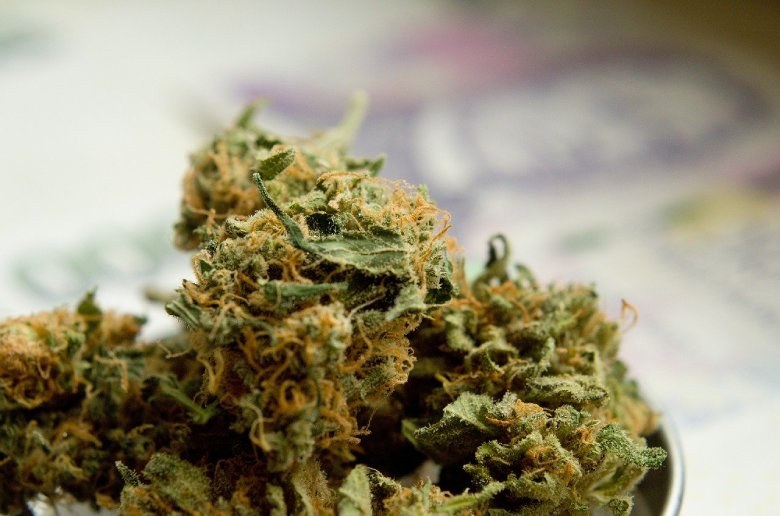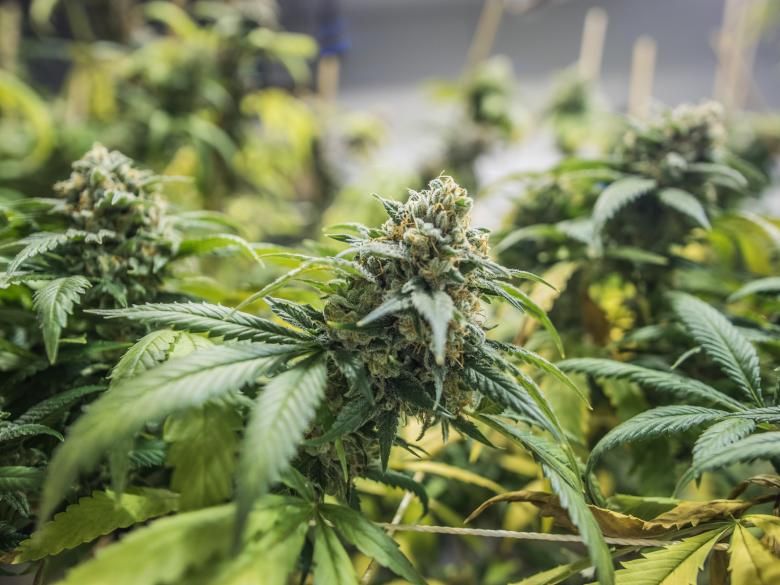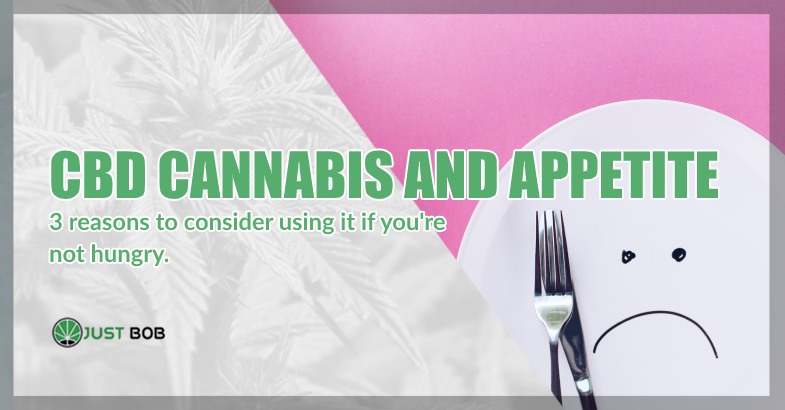Modified on: 24/04/2024
EVERYTHING THERE IS TO KNOW ABOUT THE INTERACTION BETWEEN CBD, CHEMICAL HUNGER AND WEIGHT LOSS
If you too are a CBD weed lover, you’ve probably wondered what correlation there is between CBD marijuana and appetite trigger hunger. The so-called chemical hunger is that phenomenon so famous that after smoking marijuana, you feel a great desire to eat.
But does this mechanism have a scientific basis or is it just a legend? The answer was found a long time ago for classical marijuana, which, being abundant in THC, actually has this kind of effect on the organism of those who consume it.
What happens is that THC binds to the CB1 receptors of our endocannabinoid system, stimulating the production of the ghrelin hormone, which is responsible for the feeling of hunger increase appetite. However, classic marijuana, besides being illegal, also has strong psychotropic effects, caused by the high THC content.
In contrast, CBD weed has a shallow THC content (below 0.2 per cent) and a high CBD content, the “good” cannabinoid of cannabis. Unlike classic hemp, legal cannabis can be bought in many physical shops and CBD online shops, such as JustBob.


But what is the relationship between CBD and appetite?
What you’re probably wondering is whether legal marijuana has the same effect, causing chemical hunger. The answer is no, or rather, not directly: what happens is that CBD, thanks to its antiemetic properties, counteracts the feeling of nausea, typical of people with no appetite, and intestinal inflammation.
In this way, CBD is indirectly able to help in case of lack of appetite. Besides, marijuana terpenes amplify the sense of smell and taste, making us perceive certain smells as more succulent than usual.
Let’s now look at 3 reasons why you might choose to use legal cannabis to have appetite loss combat a lack of appetite.
Read also: CBD Cannabis and voluntary blood donations: what is the rule?
1) CBD and appetite: legal cannabis is a natural and chemical-free product.
As we have said in the previous lines, the antiemetic action of CBD, contained in high percentages in legal cannabis, fights the feeling of nausea and vomiting typical of people with no appetite. The repulsion and decreased appetite for food can be due to many factors but often coincides with some health problem.
One serious risk of bias in the typical situations is in case of cancer, but even minor discomforts such as anxiety can lead to lack of appetite. Eating is fundamental for our body and not doing so, especially when you are sick, does not help to heal quickly.
Using CBD cannabis to boost appetite and soothe the feeling of nausea can be an excellent natural remedy, as it is a certified organic product (like Justbob’s cannabis inflorescences) and free of toxic substances. Therefore, using legal marijuana may help you to reawaken your appetite and regain optimal health.
2) Combat lack of appetite with CBD: use legal cannabis without medication.
As you already know, lack of appetite is often linked to health problems, whether they are major or minor. CBD, contained in high percentages in legal cannabis, can help soothe the sensation of nausea and vomiting and therefore, indirectly, awaken your appetite.
Hemp inflorescences come from organic crops, so it is a natural and certified product. Using light marijuana to stimulate your appetite can, therefore, be an excellent natural alternative to medications, which should never be used except in situations of extreme discomfort.
It is well known that many medications weigh down the liver and kidneys, so before opting for drug therapy, you may want to try to regain your appetite with light marijuana.
One of the most popular legal cannabis strains to combat lack of appetite is Lemon Cheese, which combines the properties of CBD, present at 19%, with lemon flower aromas, which are very pleasant in case epilepsy symptoms of nausea.
3) CBD and metabolism: use CBD oil as a dietary supplement to restore appetite.
Besides the inflorescences of legal hemp, another advantageous product to combat lack of appetite is CBD oil. It is a natural preparation derived from hemp, totally free of THC and therefore free of psychotropic effects. CBD oil is extracted from the cannabis plant and dissolved in a vegetable oil base, e.g. coconut or olive oil.
This product is sold in online shops and physical stores in various concentrations, from the lowest to the highest. Depending on how you want to use it and the physiological response of your body, you can opt for a specific concentration range or another.
CBD oil is mainly used as a dietary supplement and, thanks to its anti-inflammatory and antiemetic properties, it can help the body to combat lack of appetite. Awakening the children’s appetite again is significant, and doing so with a quality natural product, such as CBD oil, can be a good option.
Read also: Franco Loja & the Lemon Cheese Marijuana.


Can CBD Affect Appetite?
In recent years, the use of CBD (cannabidiol) has gained popularity in the health and wellness space, prompting questions about its potential impact on various aspects of the human body, including appetite and body weight. CBD, derived from the cannabis plant, is often associated with its non-psychoactive effects and diverse therapeutic applications. This text explores the relationship between CBD and appetite, shedding light on its potential effects on weight, food intake, and overall metabolic balance.
CBD for Appetite:
The interaction between CBD and appetite has been a subject of interest, with some studies suggesting potential links to weight loss or weight gain. Research in the health care space has investigated how CBD may affect appetite and body weight, particularly in the context of conditions such as chronic pain or metabolic disorders.
Appetite Suppression and Weight Loss:
Several studies have explored the possibility of CBD promoting weight loss and brown fat loss through appetite suppression. It is believed that CBD interacts with the central nervous system and cannabinoid receptors, influencing physiological processes related to food intake decreased appetite and. Furthermore, CBD has been investigated for its ability to convert white fat cells into brown fat, potentially aiding in weight and brown fat loss efforts.
Appetite Stimulation and Weight Gain:
Conversely, there is evidence suggesting that CBD may act as an appetite stimulant, particularly at higher doses. This could be beneficial for individuals struggling with appetite, weight loss, or conditions where increased food intake is desirable, such as pediatric epilepsy. Unlike THC (tetrahydrocannabinol), another compound in cannabis, CBD does not have psychoactive effects and might be a safer option for those seeking appetite stimulation without the associated high.
Clinical Trials and Research Gaps:
While there is some promising evidence regarding the effects of CBD on appetite, more research is needed to fully understand its mechanisms and potential variations based on individual factors. Clinical trials, systematic reviews, and relevant animal studies are crucial for assessing the safety, efficacy, and optimal CBD dose for appetite-related concerns.
Safety Considerations:
CBD oil’s safety and side effects, including the risk of bias in clinical trials, should be carefully evaluated. Gastrointestinal discomfort, perceived efficacy, and the presence of missing outcome data are among the factors that need attention when considering the use of CBD products, whether they are derived from hemp or cannabis.
Exploring the Connection Between Body Weight and CBD
The relationship between body weight and CBD (cannabidiol) has become a focal point of interest within the health and wellness community. As CBD gains popularity for its diverse therapeutic applications, including its potential impact on chronic pain and appetite, it’s crucial to examine its effects on body weight—whether it contributes to weight loss, both weight loss or weight gain, or other physiological responses.
CBD and Weight Loss:
Several studies have investigated the role of CBD in weight loss, particularly in the context of chronic pain management. Clinical drug investigations have explored how CBD may influence the body’s response to pain and its subsequent impact on body weight. One intriguing avenue of research involves the promotion of and promote brown fat and white fat in cells, suggesting that CBD may aid weight loss efforts by converting white fat cells into metabolically active brown fat.
Appetite Regulation and CBD:
The interplay between CBD and appetite is a complex subject. While some studies suggest that CBD may either reduce appetite or increase appetite alone, others indicate an appetite-boosting effect, especially at higher doses. The potential for CBD to control epilepsy symptoms further underscores its influence on the body’s energy balance and weight management.
Clinical Insights and Research Gaps:
A systematic review of existing literature on CBD and body weight reveals a need for more comprehensive research. Health care professionals are actively exploring how CBD treatment, whether in the form of CBD oil, capsules, or other hemp-derived CBD products, impacts various aspects of the body’s endocannabinoid system itself, including its effects on white fat cells and the regulation of appetite.
Potential Contradictory Effects:
Cannabidiol’s effects on body weight are not uniform, and research has identified potential opposing effects of endogenous cannabinoids. For instance, while cannabidiol promotes browning of fat cells, it may also stimulate appetite in certain contexts. This duality highlights the complexity of CBD’s interactions within the body, necessitating a nuanced understanding and further research to clarify more research its mechanisms.
Safety Considerations:
The use of CBD, whether in nonprescription CBD products or as part of clinical investigations, should be approached with an understanding of potential side effects. Upset stomach and stomach discomfort have been reported, emphasizing the need for careful monitoring, especially in vulnerable populations such as children.
Buy legal marijuana inflorescences and organic CBD oil against lack of appetite on JustBob.
As you may have read, fighting lack of appetite with CBD cannabis is possible, because CBD, thanks to its beneficial properties, can help your body regain its appetite. To do this, you can use light cannabis inflorescences from JustBob, our legal cannabis online shop.
Inside you will find a wide assortment of:
Legal Hash
CBD Oil
Conclusion
In conclusion, the relationship between CBD and appetite is multifaceted, with studies suggesting both appetite suppression and stimulation. As the holistic cannabis practitioner community continues to do more research to explore more research the potential benefits of CBD for appetite and lose weight control, it is essential to approach its use with caution, especially in the absence of conclusive clinical data. Further research is needed to determine the specific conditions and contexts in which CBD may be a valuable tool for managing appetite and body weight.
All our products come from organic crops and are certified, from flowers to legal hash.
What are you waiting for then? Click here and order your cannabis inflorescences now on JustBob!









